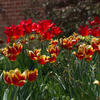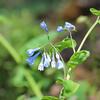Contact Us
To learn more about programs and opportunities to learn more about the healing power of plants and nature please contact Holly Lynn - [click-for-email] or 267-8107.
To learn more about programs and opportunities to learn more about the healing power of plants and nature please contact Holly Lynn - [click-for-email] or 267-8107.
Take a walk through the woodlands. Travel the campus trails. Wander through the Ambler Arboretum gardens. Stroll to the center of the Healing Garden labyrinth.
The benefits from getting outside and engaging in outdoor activities for the mind, body and spirit are well-documented. They help to create a lasting connection to nature and wildlife that helps promote happiness and good health. The Ambler Arboretum of Temple University and the Ambler Campus are an excellent resource to reconnect with the world around you and reap the healing benefits of reacquainting yourself with the natural world. Think of it as a prescription for nature, or "NatureRx."

NatureRx is a grassroots movement focused on the idea that going outside to play and relax is good for you. Everything is branded in our world, whether it be the gas we use to drive our cars or the coffee we drink to fuel ourselves. Nature is really the only thing that doesn't have a brand. Until now that is. This movement was designed to bring humor and information into sync as a campaign to get more people outside for their own good.
The Ambler Arboretum of Temple University is a center for environmental and horticultural education, research and conservation and a community resource Modeling environmental responsibility and the art and science of horticulture while celebrating the achievements of women in horticulture, preserving the historic significance of the campus and highlighting the health benefits of nature, plants, and gardening.
The Ambler Arboretum offers everything from shade covered wooded walks to gorgeous formal gardens. What better way to take your daily dose of Nature than a stroll through one of our gardens?

The ideas behind NatureRx aren't only for our personal benefit. They are also designed to change people's mindset toward being a part of nature rather than separate entities. By being a part of the natural order of things, the realities and challenges presented by climate change and sustainable living become personal issues. At the Arboretum, we take our place within nature very seriously, but we try to do so in a fun and engaging way. Through community outreach and events for all ages, we show that there is a space for everyone at any level in the natural world. There are small changes that anyone can make to bring themselves into a more sustainable mindset.
Below we have a collection of some of the facts and figures on our NatureRx cards, and the citations to the real science behind them. Read to find out more, and prescribe yourself a little NatureRx at the Ambler Arboretum of Temple University today!

Read more about these NatureRX topics by visiting the associated links below.